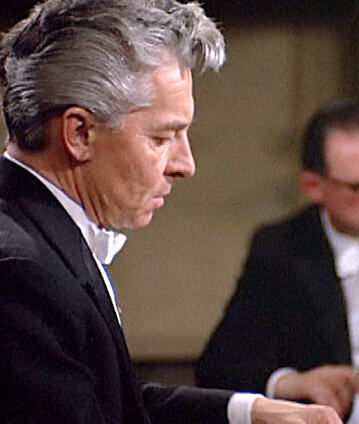Karajan conducts Bach

Although Herbert von Karajan was a great admirer of Bach, his interpretations of the composer’s music were rarely recorded on video. Here we present two of these productions with the Third Brandenburg Concerto and the Orchestral Suite No. 2, which Karajan conducts from the harpsichord. The soloist in the Suite is Karlheinz Zöller, who was principal flautist with the Philharmoniker for many years. The recordings were made in Paris in 1967/68.
“When Karajan did Bach,” the Austrian organist and composer Anton Heiller recalled, “he shed all virtuoso glamour and made music, and what marvellous music-making it was! He was part of the orchestra, rather like an 18th-century kapellmeister.” In Vienna in 1950, Karajan conducted the opening concert of the city’s bicentenary Bachfest. It included the Second Brandenburg Concerto and the Concerto in D minor for two violins with Yehudi Menuhin and Wolfgang Schneiderhan as soloists. The famous Haydn scholar H. C. Robbins Landon said: “It was a marvellous sight: Karajan conducted the concert at the Vienna Musikverein from the second harpsichord and concluded it with Cantata No. 50, ‘Nun ist das Heil’, simply magnificent.”
Karajan had a lifelong fascination with the music of Bach. In Aachen in the late 1930s his performances of the St Matthew Passion were much revered and in 1953 he recorded a famously deft and light-textured account of the B minor Mass. Bach’s music was a kind of therapy to him. “Just as it is important to find the right pulse for a piece of music, so you must find the right rhythm by which to live your life.” All six Brandenburg Concertos featured in Karajan’s Berlin concert repertoire, as did the second Orchestral Suite with soloist Karlheinz Zöller, principal flute with the Berliner Philharmoniker from 1960–69 and again, after his recovery from a serious road accident, from 1976–93.
Apart from a filmed 1984 Berlin concert, there is no visual record of Karajan’s Bach other than the two films which François Reichenbach directed in Paris in 1967–68. An art-dealer turned documentary film-maker who once wrote songs for Edith Piaf, Reichenbach was one of several experimental film-makers approached by Karajan at this time. With their eccentric cinematography and intrusive use of close-up, the films were never released during Karajan’s lifetime.
© 1967 / 68 Unitel
Category
Artists
Our recommendations
- Karajan conducts Brahms’s “German Requiem” in Salzburg
- Karajan conducts Beethoven’s “Missa solemnis” in Salzburg
- Claudio Abbado conducts Brahms’s Requiem in Vienna
- Daniel Barenboim and Plácido Domingo at the 1992 Europakonzert in the Escorial
- Simon Rattle conducts Wagner’s “Götterdämmerung” at the Festival d’Aix-en-Provence
- 2002 Europakonzert from Palermo with Claudio Abbado and Gil Shaham